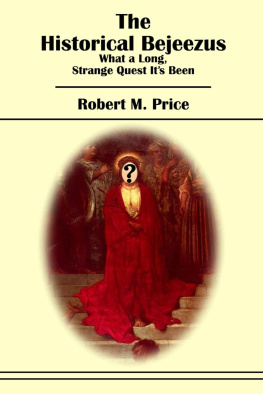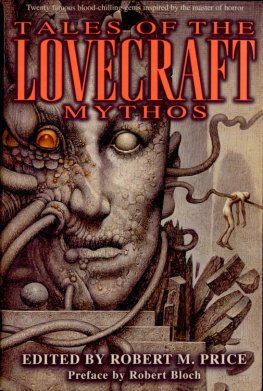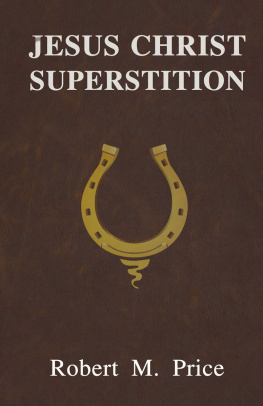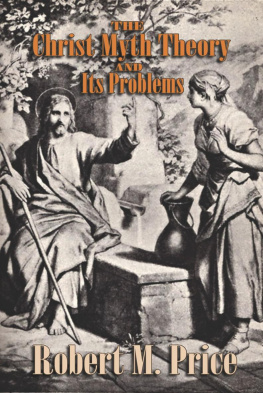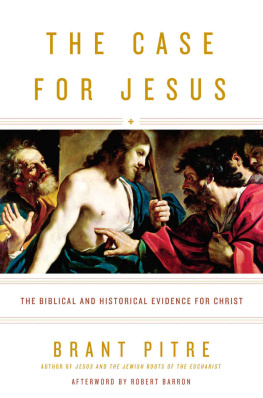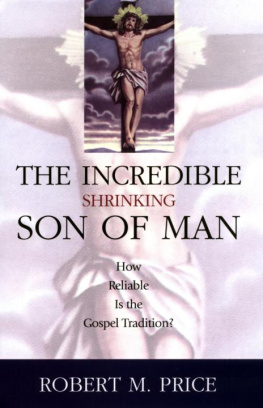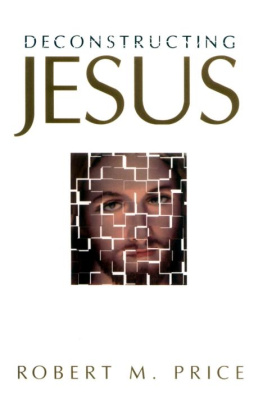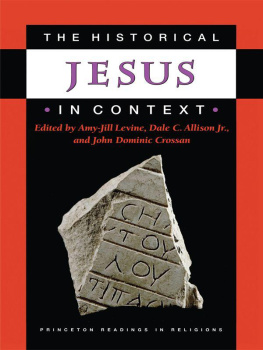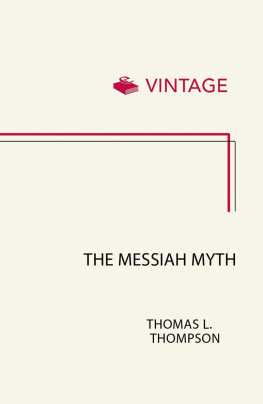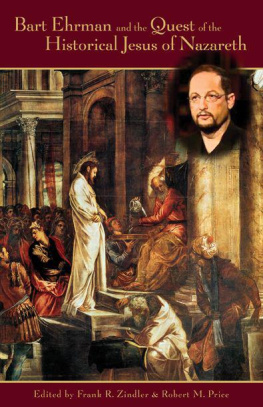Table of Contents
The Historical Bejeezus
The Historical Bejeezus
What a Long, Strange Quest Its Been
By Robert M. Price

2013
American Atheist Press
Cranford, New Jersey
ISBN 13: 978-1-57884-025-0
ISBN 10: 1-57884-025-2
Copyright 2013 by American Atheist Press
225 Cristiani Street
Cranford, New Jersey 07016-0158
FAX: (908) 276-7402
www.atheists.org
All rights reserved. No part of this publication may be reproduced, translated, stored in a retrieval system, or transmitted in any form or by any means, electronic, mechanical, photocopying, or recording, or otherwise without prior permission from the publisher.
Printed in the United States of America
The Historical Bejeezus, What a Long, Strange Quest Its Been
Written by Robert M. Price
Cover design by Carol Price after Gustav Dor
Library of Congress Cataloging-in-Publication Data
Price, Robert M., 1954-
The historical Bejeezus : what a long, strange quest its been / by Robert M. Price.
pages cm
ISBN 978-1-57884-024-3 (alk. paper)
1. Jesus Christ--Biography--History and criticism. 2. Jesus Christ--Historicity. I. Title.
BT303.P75 2013
232.908--dc23
2013022528
Dedicated to Rich Griese
Indefatigable Genius
Introduction:
The Quest for the Historical Bejeezus
I have been intensely interested in the historical Jesus problem for many years. At first my goal was to reassure myself that the gospel portraits of Jesus were genuine history. The farther I proceeded down this path, the less I judged the gospels to be faithful representations of a historical figure, finally gravitating toward the radical theory that there was no historical basis to the Jesus figure at all. In my studies I sought acquaintance with the works of major scholars in the field, and there were many of these, not that Im complaining. Indeed I have found the works of scholars of all stripes and shades of opinion enlightening and fascinating. There is always something to learn even from works with which one feels forced to disagree. Even works whose extravagant speculations scare the Bejeezus out of you.
For the earlier phases of Jesus research I was dependent upon Albert Schweitzers magnum opus known in English translation as The Quest of the Historical Jesus . In it he summarized and analyzed in real depth just about all previous life of Jesus books. Of course, where I could obtain the books he discussed, at least in translation, I hastened to devour them, too. What a feast! And then I rounded up the books written since Schweitzer, and there were very many of them, too. And that brings me to both the subject and the approach of the present volume, a collection of my essays and (mainly) reviews of historical Jesus scholarship. My flagship essay, The Quest of the Quest of the Historical Jesus, is a paper given to the Jesus Seminar. Subsequently it formed the basis of my book Deconstructing Jesus . It traces and comments upon major trends in the ongoing safari to bag Jesus, seeking to draw out certain important implications of some of todays hottest New Testament critics, who in my opinion do not follow their own insights to their natural and more radical conclusions.
The rest of the contents of this quest for the historical Bejeezus takes the form of book reviews. I am the book review editor for the Life of Jesus section of the Religious Studies Review , but most of these review essays appeared in The Journal of Higher Criticism , where I had the liberty to take a more expansive approach, interacting in more detail both with the authors of the books under review and with the issues themselves. These reviews are, I think, essays in their own right, offering my own perspectives on the work of fellow scholars and on the issues over which we may differ. And there are frequent and serious differences! I take quite seriously even works considered eccentric by the (often dull) mainstream of conventional scholarship. It is only by taking such books seriously, rather than offering facile mockery and disdain, that one can tell the difference between nonsense and brilliant new theories. But I have no wish to defend nonsense, and my books title pretty well indicates that I find a good bit of it in several of the books I review. And, again, it is my job to show why they are nonsense if indeed they are.
By compiling reviews, I am seeking to emulate the great Schweitzer who, as I say, spent chapter after chapter of The Quest of the Historical Jesus in what amounts to detailed book reviews. I like that approach. One reason I prefer it is that it has always helped me to compare notes with scholars about major scholarly works of which I seek to do my own evaluation. For instance, if I can compare my reading of Bultmann with Tillichs understanding of him, I stand to understand the work of both men better. Likewise, I hope that you will read some of the books I treat here, not taking my word as gospel but rather so you can compare notes with me as a fellow scholar. And that is always my goal: not to create disciples of my own, but to facilitate my readers forming their own syntheses. If I can provide new information and perspectives, I have done my job. The rest is up to them (you).
But I will not shy away from telling you that, if you are interested in my theories on the Jesus question (perhaps having read my books Deconstructing Jesus , The Incredible Shrinking Son of Man , etc. ), you may find more here. It is an ancient practice to employ as vehicles for the expression of ones own insights older texts on which one comments. We read Platos Socratic dialogues more to learn what Plato taught than what Socrates himself said. We are probably not so much interested in the Vedanta Sutras of Bhadarayana as we are in Shankaras own theosophy when we read the latters commentary on the former. Your thinking will be informed and expanded when you read various scholarly works, and mine has been as well. In these pages you will see me thinking aloud (or in print, I guess), and I invite you to join me.
Robert M. Price,
May 25, 2012
[begin p. 13]
Chapter One:
The Quest for the Quest of the Historical Jesus
I believe that Ernest Renan, ( The Quest of the Historical Jesus: A Critical Study of its Progress from Reimarus to Wrede , 1906) demonstrated in merciless detail how the already long parade of Jesus books suffered from their authors lacking in one or the other of Renans two prescriptions, either the sympathy or the critical distance.
He showed how theologians who were intellectually liberal enough to be able to throw off the blinders of traditional dogma were yet so captivated by their own modernistic form of faith that they could not imagine a historical Jesus who did not look pretty much like them, parroting enlightened nineteenth-century ethical monotheism, etc. Their Jesus was, like them, uninterested in theological dogma. Rather he promoted the higher righteousness and the infinite value of the individual soul (as Adolf von Harnack,
[begin p. 14]
perhaps the quintessential liberal Jesus historian, put it in What Is Christianity? 1899). An implacable and acerbic foe of Pharisaic (and, implicitly, Catholic or Protestant) legalism, this Jesus pioneered the Social Gospel and exemplified the soul entirely open to God. As Schweitzer pointed out, once Jesus had been reimagined in this way, historical criticism was invariably replaced by novelizing, psychologizing, and rationalizing. That is, the supernatural was explained away, Jesus inner feelings and struggles were imagined, and the blanks were filled in accordingly.
Like their conservative cousins, the liberal questers were in the final analysis playing a game of tug-o-war using Jesus as the rope. It was as in Luke 12:1314, with one brother appealing to Jesus against the other, Master, tell my brother to divide the inheritance with me. But now as then, Jesus will have none of it: O man, who made me a judge or arbiter over you? The historical Jesus, Schweitzer showed, turns out to be as alien to our day as he was to his own. He is an embarrassment equally to dogmatic Trinitarian and to liberal religionist, a creature of his own age stamped indelibly with the assumptions of that age.

